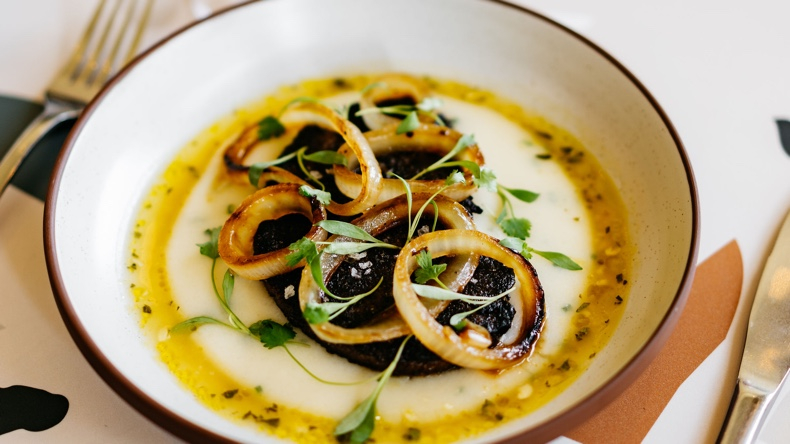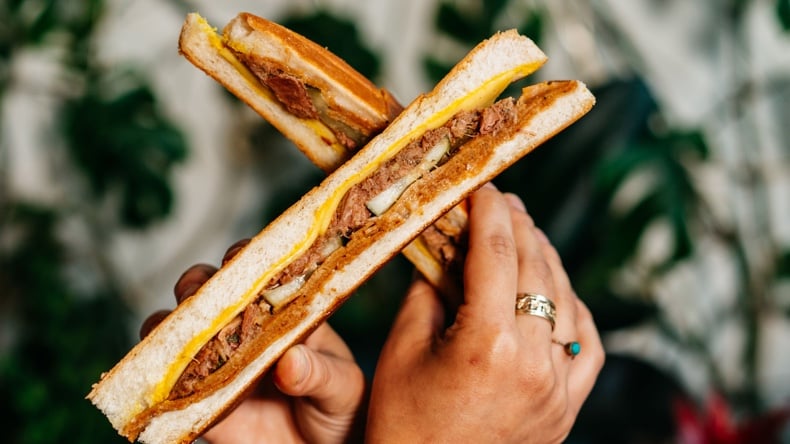Chefs and Restaurants
Vegan Cuban Food Is a Reality for Reid Trapani and Sophia Marchese Trapani
At La Semilla in Atlanta, Chef/Co-Owner Reid Trapani isn’t trying to convert guests to veganism. He simply wants to serve delicious Latin food that happens to be plant-based. “That’s the whole goal and the opportunity that we’re trying to create from a dining perspective,” says Reid. “You don’t have to be plant-based. You could leave our restaurant and go get ice cream next door. But when you eat our food, hopefully you’re inspired.” The menu spans Latin cuisines including Mexican and Argentinian, but Cuban dishes are at the heart of the operation.
Reid owns the restaurant with his wife, Sophia Marchese Trapani, who oversees the beverage program. They originally connected through their love of music, and it wasn’t until 2017, when Sophia worked as a private chef for a woman on a vegan diet, that they decided to give a vegan diet a try. “We started eating healthier and doing research and then eventually moved into both being vegan,” recalls Sophia, who tested recipes at home.
It sparked a love of cooking plant-based dishes together, and in 2018 they founded Happy Seed, a catering service and pop-up. They weathered the pandemic through takeout-only pop-ups while hunting and saving for the right spot to open a restaurant. La Semilla, which translates to “the seed,” opened in January in Atlanta’s Reynoldstown neighborhood. The tropical locale sports a banana leaf print above the bar, and earthy hues warm the restaurant.

From the beginning, it was important to Sophia to recreate the Cuban dishes of her youth. Her grandmother was a Cuban immigrant, and Sophia grew up with picadillo, ropa vieja, and croquettes filled with ham and cheese. In their apartment kitchen, Reid endeavored to find plant-based alternatives that were just as flavorful as the originals.
“Nothing worked,” laughs Reid. “Everything I do now was born from trial and error and relentless determination.” For example, he found he had to adjust the acidity of the picadillo when making it with seitan, a gluten-based meat substitute, because it doesn’t have the same fat content as traditional ground beef. “It was just too much tomato sauce and there’s no fat from the meat that renders into the sauce to give it that palatable feel,” he says.
Even the seitan itself is a result of Reid’s persistent tweaking over the course of five years. Seitan starts with a dough base of wheat gluten and flour, which, on its own, tastes bland. Then, it’s cooked in a liquid which adds flavor—that’s where Reid found he had to get creative with seasonings such as smoked paprika, smoked salts, and onions. “Then you’re left with this really savory, umami, meaty texture and flavor,” he says. The “ham” used in the Cubano is prepared similarly to the seitan, but incorporates tofu into the recipe, giving it a smoother texture. “When it’s sliced, it’s floppy and you can shake it around just like you could ham,” he adds.

Reid especially takes pride in his Cubano sandwich. He’s intentional about which ingredients compose the sandwich—the bread is Cuban bread sourced from La Segunda in Tampa, the vegan cheese is made by California-based Follow Your Heart, and the pork is marinated jackfruit—but also about the sandwich’s construction. The acidic elements, like the pickles and mustard, are layered between the jackfruit, ham, and cheese. “That way, when you’re biting into it, you have levels and buffers in between all of it so your mouth isn’t just getting obliterated by acidic components,” says Reid. A vegan aïoli slathered on one side of the bread adds a subtle fattiness that ties it all together.
Some of Reid’s reimagined dishes don’t rely on faux meat at all. His play on bistec de palomilla uses lion’s mane mushrooms as a stand-in for beef. It’s hand-pressed on a hot surface to remove moisture while boosting the meaty texture. The mushrooms are cooked, cooled, and then, to-order, pan-seared in vegan butter. They sit atop a cauliflower-yuca mash and are crowned with caramelized onions and a tangy mojo sauce. “It’s prepared very carefully with respect to the lion’s mane mushroom itself,” says Reid.
He finds the biggest satisfaction comes from happy Cuban guests. “They’re so skeptical and looking at you like they want to tell you this sucks,” he says. “Then they eat it and you see this light bulb go off.” He’s seen guests call family in Miami to tell them all about the vegan Cuban food and how good it is. “And that is what it’s all about for me. We get to change people’s perspectives all through food,” says Reid. “It’s wonderful and a testament to innovation and just really working hard.”
Lia Picard is an Atlanta-based freelance writer.
